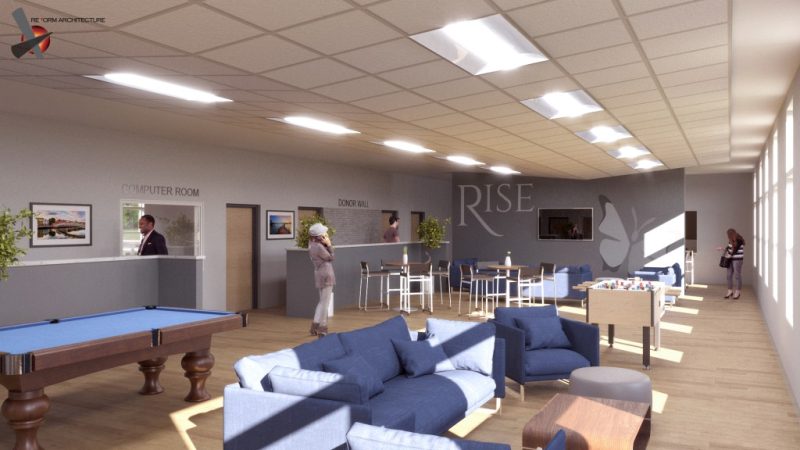RISE needs your help to create Homebase– a place that will combat isolation and provide semi-structured therapeutic opportunities for people to develop skill sets and a natural support system. It’s a low-barrier, psychosocial day program that will provide a supportive, safe community for vulnerable citizens to simply exist and be accepted. The Homebase program will be located at the RISE Main Office at 127 Union Street in Saratoga Springs within walking distance of the Route 50 CDTA Bus Line.

Help us reach our goal of $3,566,000 needed to create Homebase by donating today! RISE is very grateful to everyone has supported our dream to create Homebase especially Congressman Paul Tonko for securing Community Project Funding (HUD).
We also thank these community partners for their generous donations towards making Homebase a realty:
- Sonny and Julie Bonacio
- The Sarah B. Foulke Charitable Fund
- The Adirondack Trust Company
- Stewart’s Shops/Dake Family
- Church of Latter-Day Saints-Albany
- Saratoga Eagle
- Business For Good Foundation
- Community Bank
- CDPHP
- Woods Oviatt Gilman LLP
- Residence Inn by Marriott
- Courtyard by Marriott
- J.M. McDonald Foundation
- Joseph & Luann Conlon Charitable Fund
- In Memory of Peter M. Nevius
- Several Private Donors

Within the Saratoga community exists a segment of people that, for various reasons, are unable to participate in day-to-day activities typical of the general population. This results in self-imposed isolation, or congregation in inappropriate public spaces unconducive to healthy, positive activities.
The psychosocial program model that Homebase follows has been proven to result in positive health outcomes and is substantially more cost-effective than other mental-healthcare approaches. Beneficial outcomes include:
- Reduced costs:
- 1/3 of the cost of the Individual Placement and Support model (supported employment).
- About 1/2 the annual cost of Community Mental Health Centers.
- Costs substantially less than the Assertive Community Treatment model.
- 1 year of social club services costs per participant are on par with only 1-week of psychiatric hospitalization.
- Significant decrease in hospitalizations.
- Reduced incarcerations, with criminal justice system involvement substantially diminished during and after psychosocial program engagement.
- Improved well-being compared with individuals receiving psychiatric services without psychosocial programming.
- Improved mental AND physical health.

The Homebase program will provide peer support and opportunities to combat isolation and provide semi-structured therapeutic activities for people to develop daily living skills and a natural support system.
Homebase will include:
Telehealth Conference Rooms: Private rooms for individuals to have telehealth meetings with their service providers.
Café/Kitchen: A space to serve and enjoy a meal, and to be additionally used for life-skills workshops/pre-vocational classes.
Computer Room: Vital for teaching computer skills, explaining cyber safety, online learning, and job searches. Will be used for workshops and free internet access.
Workshops: Dedicated spaces for classes: money management (banking basics, budgeting and saving, on-line banking), home management (grocery shopping, cleaning, hygiene), community awareness (social interactions, local resources).
Living Room: Open central area for participants to interact and relax in a safe space. There will be games, books, a television, a pool table, and a foosball table.
Art Studio: Art therapists will provide programming to participants and members of the wider community.

